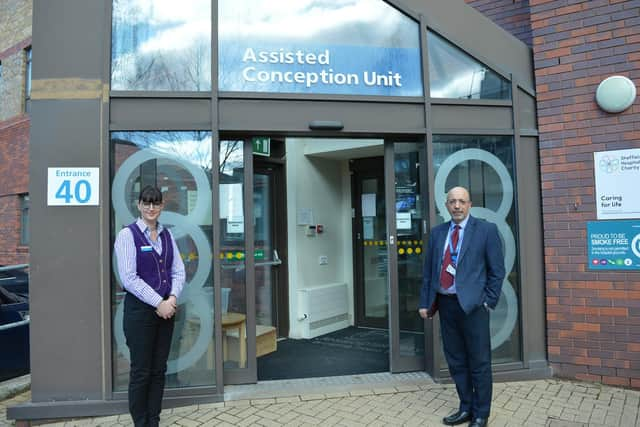Sheffield hospital to lead the way in pioneering fertility treatment
and live on Freeview channel 276
The study, which is being funded by the NIHR (National Institute for Health Research), will assess if removing small fibroids and endometrial polyps improves women’s chances of having a baby.
It will run across 30 gynaecology and fertility centres across the UK, will be the first to assess if removing smaller fibroids and endometrial polyps improves women’s chances of a successful pregnancy, and increases live birth rates, in those undergoing treatments for infertility and recurrent miscarriages.
Advertisement
Hide AdAdvertisement
Hide AdFibroids and endometrial polyps, or non-cancerous tumours of the uterus, are very common, especially in reproductive-age women. They are currently routinely diagnosed, treated and removed using an internal investigation of the womb known as a hysteroscopy.


However, although these growths have long been linked to problems associated with getting pregnant, there is limited clinical evidence to demonstrate that their removal increases live birth rates and improves fertility.
The findings of the £1.8m HELP Fertility? trial will help to determine if smaller fibroids and endometrial polyps should be removed during fertility treatment.
Chief Investigator Mr Mostafa Metwally, Consultant Gynaecologist and Sub-specialist in Reproductive Medicine and Surgery explained: “We are delighted to be leading this £2m study. Hysteroscopy is an optional additional treatment offered to women with smaller fibroids and endometrial polyps as part of their fertility treatment. Yet there is little clinical evidence to support its use in those undergoing IVF or assisted conception.
Advertisement
Hide AdAdvertisement
Hide Ad“This gold standard study will provide women with much-needed answers as to its benefit, enabling them to make an informed decision as to whether they should delay fertility treatment to have these smaller fibroids and polyps removed or leave them in place. As well as demonstrating the clear benefit of hysteroscopy as an optional add-on fertility treatment, we will also assess if there is a potential negative impact on women’s fertility of hysteroscopy, which some women find invasive and painful.”
The grant award is the third successive multi-million pound grant obtained by the team of gynaecologists and researchers based at Sheffield Teaching Hospitals’ Jessop Wing in the past few years. The research will be supported by the University of Sheffield’s Clinical Research Trials Unit.
1,120 women are set to take part in the study, which is due to commence on 1 April 2021.
Lead Research Nurse for the study Clare Pye added: “All our research is designed with patients in mind, so we are delighted to be at the forefront of yet another major funding award which will provide women with the high quality evidence they need to make informed decisions about their care when they plan and receive fertility treatment.”
Advertisement
Hide AdAdvertisement
Hide AdAround 20 to 40 percent of women with unexplained infertility are found to have fibroids and around 15 to 20 percent endometrial polyps.
The study is expected to take around two and a half years, with initial findings due to be published in summer 2025.